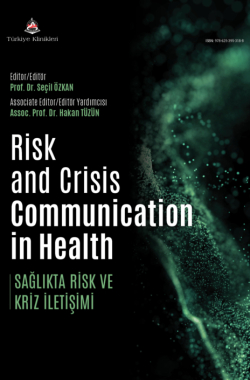Role of Leadership in Health Crisis Communication
Kadir Serdar YILMAZa , Seçil ÖZKANa
aGazi University Faculty of Medicine, Department of Public Health, Ankara, Türkiye
Yılmaz KS, Özkan S. Role of leadership in health crisis communication. In: Özkan S, ed. Risk and Crisis Communication in Health. 1st ed. Ankara: Türkiye Klinikleri; 2024. p.23-8.
ABSTRACT
Health crises are difficult to manage and if not managed well, it is inevitable that fear and anxiety will prevail in the community. During a crisis, the pressure on management and health workers is expected to increase. In this turbulent period, society needs people to lead and play a role. Health managers who stand out with their leadership play a very important role in overcoming health crises with minimal damage. Communication should be used effectively in health crises as in every crisis. Effective communication between the community, health workers and scientists during the crisis will facilitate the management of the process. The leader’s quick reaction and transparent information to the public about the current situation will provide an environment of trust. The most up-to-date communication channels should be selected for the messages to be given during the health crisis and an example should be set for the society throughout the process. It is the leader’s duty to learn from the mistakes made during the crisis communication process and ensure that they are not repeated in the future.
Keywords: Leadership; communication; public health
Kaynak Göster
Referanslar
- Burkle Jr FM. Challenges of global public health emergencies: development of a health-crisis management framework. The Tohoku journal of experimental medicine. 2019;249(1):33-41. [Crossref] [PubMed]
- Assefa Y, Gilks CF, Reid S, van de Pas R, Gete DG, Van Damme W. Analysis of the COVID-19 pandemic: lessons towards a more effective response to public health emergencies. Globalization and Health. 2022;18(1):10. [Crossref] [PubMed] [PMC]
- Deitchman S. Enhancing crisis leadership in public health emergencies. Disaster medicine and public health preparedness. 2013;7(5):534-40. [Crossref] [PubMed]
- Glenn J, Chaumont C, Villalobos Dintrans P. Public health leadership in the times of COVID-19: a comparative case study of three countries. International Journal of Public Leadership. 2021;17(1):81-94. [Crossref]
- HarperCollins. (2021). Crisis. In Collinsdictionary.com. Retrieved March 01, 2024, from [Link]
- Ulmer Robert R. Effective Crisis Management through Established Stakeholder Relationships: Malden Mills as a Case Study. Management Communication Quarterly. 2001;14(4):590-615. [Crossref]
- Panos E, Dafni P, Kostas G, Zacharoula M. Crisis Management in the Health Sector; Qualities and Characteristics of Health Crisis Managers. International Journal of Caring Sciences. 2009;2(3):105-7.
- Bulduklu Y, Karaçor S. Sağlık Hizmetlerinde Kriz İletişimi ve Yeni Medya. Atatürk İletişim Dergisi. 2017;(14):279-96.
- Enginol İ. Doğal afetler ve sağlık kurumlarında kriz yönetimi (Order No. 28527164). Available from ProQuest Dissertations & Theses Global. 2000. (2582800802). Retrieved from [Link]
- Güreşçi M. COVID-19 Salgınında Türkiye'de Kriz Yönetimi İletişimi: T.C. Sağlık Bakanlığı. Avrasya Sosyal ve Ekonomi Araştırmaları Dergisi. 2020;7(5):53-65.
- Baygül Özpınar B, Aydin ŞG. Kriz İletişiminde İnfografik Kullanımı: Covid-19 Pandemi Sürecinde İnfografikler Üzerine Bir İnceleme. İstanbul Ticaret Üniversitesi Sosyal Bilimler Dergisi. 2020;19(37):240-61.
- Akyüz M. COVID-19 Pandemisi Bağlamında Sağlık Hizmeti Sunan Örgütlerde Kriz Yönetimi Yaklaşımları: Kıyaslamalar ve Bir Model Önerisi. Stratejik Yönetim Araştırmaları Dergisi. 2020;3(2):159-78.
- Sorenson JH. Hazard warning systems: review of 20 years of progress. Nat Hazards Rev. 2000;1:119-25. [Crossref]
- Perry RW, Greene MR, Lindell MK. Enhancing evacuation warning compliance: suggestions for emergency planning. Disasters. 1980;4(4):433-49. [Crossref]
- Kress G. Literacy in the new media age. Routledge; 2003. [Crossref]
- Ansari A, Riasi A. An investigation of factors affecting brand advertising success and effectiveness. International Business Research. 2016;9(4):20-30. [Crossref]
- OECD. The changing face of strategic crisis management. Paris: OECD Publishing; 2015. Available from: [Crossref]
- Öztürk G, Öymen G. Sağlık İletişiminde Sosyal Medya Kullanımının Stratejik Önemi: Türkiye'de Kalp Sağlığı ile İlgili Kâr Amacı Gütmeyen Kuruluşlar Üzerine Bir Değerlendirme. Galatasaray Üniversitesi İletişim Dergisi. 2014;109-32.
- Surugiu F, Surugiu I. Leadership and Crisis Management during Crisis Situations. Annals (Constanţa Maritime University). 2012;13(17):303-6
- Tuğcu Ş. Kriz Yönetiminde Liderlik Kavramının Önemi. Selçuk İletişim. 2013;3(2):16-22.
- D'Auria G, De Smet A. Leadership in a crisis: Responding to the coronavirus outbreak and future challenges. Psychology. 2020;22(2):273-87.
- Gezgüç GM, Duman D. Pandemiyle Mücadele ve Siyasi Liderlerin Tutumları: ABD, Almanya, Brezilya ve Yeni Zelanda Karşılaştırması. Avrasya Sosyal Ve Ekonomi Araştırmaları Dergisi. 2020;7(7):253-75.
- Murphy SK. Crisis Management Demystified, University Business. 2003;6(2).
- Grint K. Leadership, management and command in the time of the Coronavirus. Leadership. 2020;16(3):314-9. [Crossref]
- Soysal A, Paksoy HM, Özçalıcı M. Kriz yönetiminde liderlik yeteneğinin bazı demografik değişkenler açısından incelenmesi. Girişimcilik ve Kalkınma Dergisi. 2011;6(1):222-48.
- Topcu M. Kriz Liderliği ve Krizleri Fırsata Çevirmede Dönüştürücü-Vizyoner Liderlik. Akademik Hassasiyetler. 2017;4(8):71-100.
- Aydıntug Myrvang N, Ölmez D, Mete M. Sağlık Yöneticilerinin Kriz Yönetim Becerileri ve Liderlik Stilleri Arasındaki İlişki. International Journal of Entrepreneurship and Management Inquiries. 2021;5(9):356-79.
- Crandall WR, Parnell J A, Spillan JE. Crisis management: Leading in the new strategy landscape. Sage Publications. 2013.
- Leadership in a Crisis. (n.d.). [Link]
- World Health Organization. (2004). Sixth futures forum on crisis communication. World Health Organization Europe. [Link]
- Seeger MW, Sellnow TL, Ulmer RR. Communication, Organization, and Crisis, Annals of the International Communication Association. 1998;21(1):231-76. [Crossref]
- Subbarao I, Lyznicki J, Hsu E, et al. A Consensus-based Educational Framework and Competency Set for the Discipline of Disaster Medicine and Public Health Preparedness. Disaster Med Public Health Preparedness Journal. 2008;2:57-68. [Crossref] [PubMed]
- Jankelová N, Joniaková Z, Blštáková J, Skorková Z, Procházková K. Leading Employees Through the Crises: Key Competences of Crises Management in Healthcare Facilities in Coronavirus Pandemic. Risk management and healthcare policy. 2021;14:561-73. [Crossref] [PubMed] [PMC]
- Younis JA, Hejase HJ, Dalal HR, Hejase AJ, Frimousse S. Leaderships. Role in Managing Crisis in the Lebanese Health Sector: An Assess-ment of Influencing Factors', Research in Health Science. 2022;7(3):54-97. [Crossref]
- Pfrimer MH, Barbosa Jr R. Brazil's war on COVID-19: Crisis, not conflict-Doctors, not generals. Dialogues in Human Geography. 2020;10(2):137-40. [Crossref]
- Struye de Swielande T. Trump and COVID-19: The arrogance of ignorance (No. UCL-Université Catholique de Louvain. 2020.

